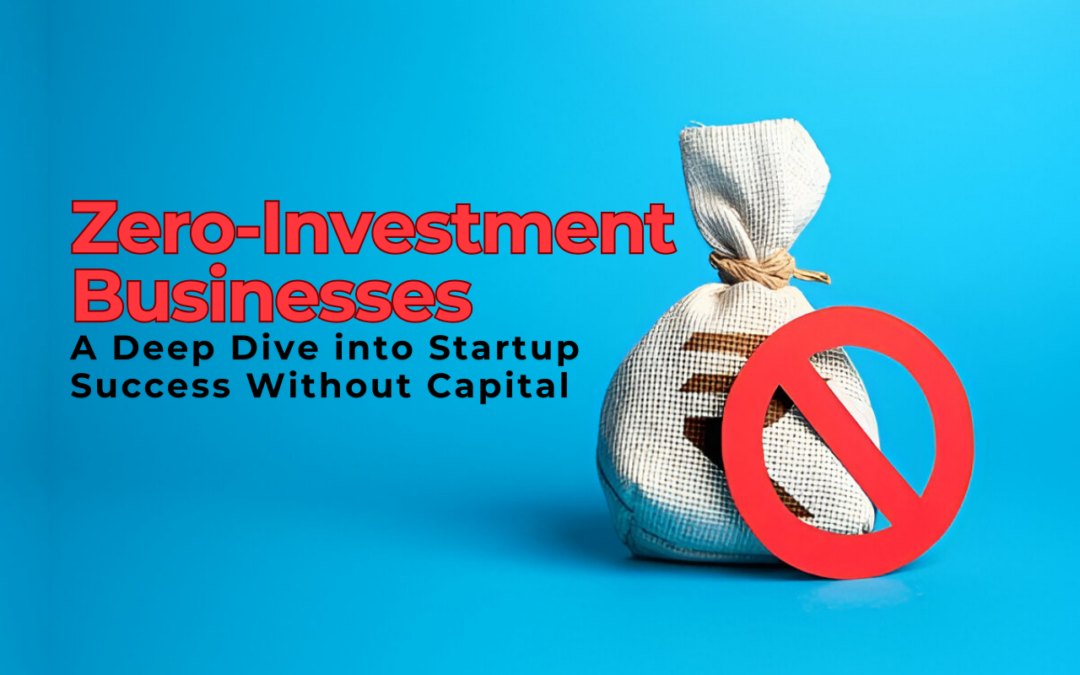Starting a business often conjures images of venture capital, hefty loans, and substantial financial risks. But in today’s entrepreneurial landscape, a growing narrative challenges this traditional view: the possibility of launching a business with zero investment businesses. Is this merely a catchy myth, or is there a realistic path to startup success without capital? Let’s dive into the intricacies of this concept and explore actionable strategies for aspiring entrepreneurs.
The Appeal of Zero-Investment Businesses
The term “zero-investment business” has undeniable allure, especially for aspiring entrepreneurs constrained by financial limitations. It suggests a low-risk entry into entrepreneurship and opens doors to anyone willing to leverage creativity, time, and skills.
Moreover, the internet and digital tools have dramatically reduced the costs associated with starting a business. Platforms like social media, free website builders, and online marketplaces enable entrepreneurs to establish a presence without the need for significant upfront capital.
The Myth: Zero Investment Means No Costs
While “zero investment” sounds appealing, it’s important to unpack the term. No business can operate without some form of investment—be it money, time, or resources. Here’s why:
- Time is Currency: Time spent planning, creating, and marketing your business is an investment. For instance, building a brand presence on social media demands consistent effort.
- Hidden Costs: Even seemingly free tools often come with limitations. Upgrading to premium features or accessing advanced analytics may require monetary input.
- Personal Resources: Skills, equipment, or pre-existing assets (like a computer or smartphone) are foundational investments, even if not financial.
Realistic Zero-Investment Business Ideas
Despite the nuances, numerous businesses can indeed start with minimal financial resources. Here are some viable zero-investment business ideas:
1. Freelancing
Platforms like Upwork, Fiverr, and Freelancer allow individuals to monetize skills such as writing, graphic design, programming, and digital marketing. If you already possess expertise in a particular domain, freelancing is a great way to earn without upfront capital.
2. Consulting
If you’re an expert in a niche area—be it career counseling, financial planning, or business strategy consulting is a low-cost way to monetize your knowledge. Building a professional LinkedIn profile and networking with potential clients can kickstart your consulting journey.
3. Content Creation
Blogging, podcasting, and YouTube content creation are popular zero-investment ventures. While these require time and consistency, platforms like WordPress (free plan), Anchor.fm, and YouTube offer accessible entry points. Over time, you can monetize through ads, sponsorships, or affiliate marketing.
4. Affiliate Marketing
Affiliate marketing allows you to earn commissions by promoting products or services. All you need is an online platform (e.g., a blog, social media, or email newsletter) to recommend products and include affiliate links.
5. Online Courses or E-books
If you have expertise in a specific field, creating an online course or writing an e-book can generate income. Platforms like Gumroad or Teachable enable you to sell digital products with minimal upfront costs.
6. Print-on-Demand (POD)
With POD platforms like Printful or Teespring, you can design and sell custom merchandise without investing in inventory. The platform handles printing, shipping, and fulfillment, while you earn a commission on sales.
7. Virtual Assistance
As a virtual assistant, you can provide administrative, technical, or creative support to businesses remotely. This requires minimal equipment (usually just a computer and internet connection).
Strategies to Succeed Without Capital
Launching a business without significant financial investment demands ingenuity, effort, and strategic planning. Here are actionable strategies to maximize your chances of success:
1. Leverage Free Tools and Resources
The internet offers a plethora of free tools to help entrepreneurs:
- Canva for graphic design.
- Google Workspace for email and document collaboration.
- HubSpot CRM for customer relationship management.
- Hootsuite for social media scheduling.
2. Build a Strong Personal Brand
A personal brand can be a powerful asset in zero-investment ventures. Share valuable content on platforms like LinkedIn, Twitter, or Instagram to establish yourself as an authority in your niche.
3. Start Small and Scale
Focus on offering a single service or product initially. As you gain traction and generate revenue, reinvest in expanding your offerings or upgrading your tools.
4. Utilize Social Media for Marketing
Social media platforms are invaluable for reaching your target audience at no cost. Engage with followers, post regularly, and utilize hashtags and trends to amplify your visibility.
5. Network Strategically
Networking can open doors to collaborations, mentorships, and client opportunities. Attend virtual events, join online communities, and actively engage with professionals in your industry.
6. Offer Value Before Asking for Money
Building trust is crucial in zero-investment businesses. Share free resources, tips, or advice to showcase your expertise and attract potential clients or customers.
Overcoming Challenges in Zero-Investment Businesses
Operating with minimal resources is not without its challenges. Here’s how to address common hurdles:
1. Limited Reach
- Solution: Collaborate with influencers or partners to amplify your reach. Guest blogging or co-hosting webinars can introduce your business to new audiences.
2. Slow Revenue Growth
- Solution: Patience is key. Focus on building a loyal customer base and delivering exceptional value. Over time, word-of-mouth referrals can drive growth.
3. Skill Gaps
- Solution: Invest time in self-learning. Platforms like Coursera, Udemy, and YouTube offer free or low-cost courses on various skills.
4. Lack of Credibility
- Solution: Gather testimonials, case studies, or reviews from early clients. Even unpaid projects can help build a portfolio that demonstrates your capabilities.
Success Stories: Inspiring Examples
1. Sarah’s Freelance Writing Journey
Sarah, a stay-at-home mom, began her writing career on Medium, earning income through the platform’s Partner Program. Her engaging articles attracted clients who sought her freelance writing services. With zero upfront costs, Sarah built a thriving business.
2. John’s Print-on-Demand T-shirt Empire
John started designing T-shirts on Canva and selling them via Teespring. By leveraging social media to market his designs, he scaled his side hustle into a six-figure business.
3. Maria’s Virtual Assistant Success
Maria turned her organizational skills into a profitable virtual assistant business. Using free tools and platforms like Zoom and Asana, she catered to small businesses, eventually growing her team to handle multiple clients.
Conclusion: Zero-Investment Businesses Are Possible, but Not Effortless
The idea of a zero-investment business is not a myth, but it requires redefining what “investment” means. While financial capital may not be a prerequisite, time, effort, and resourcefulness are essential currencies for success.
By leveraging skills, digital tools, and creative strategies, aspiring entrepreneurs can indeed build thriving businesses without hefty budgets. The journey might be challenging, but the rewards of creating something meaningful and self-sustaining are worth the effort. So, if you’ve been holding back due to financial constraints, now is the time to take the leap and turn your entrepreneurial dreams into reality.













